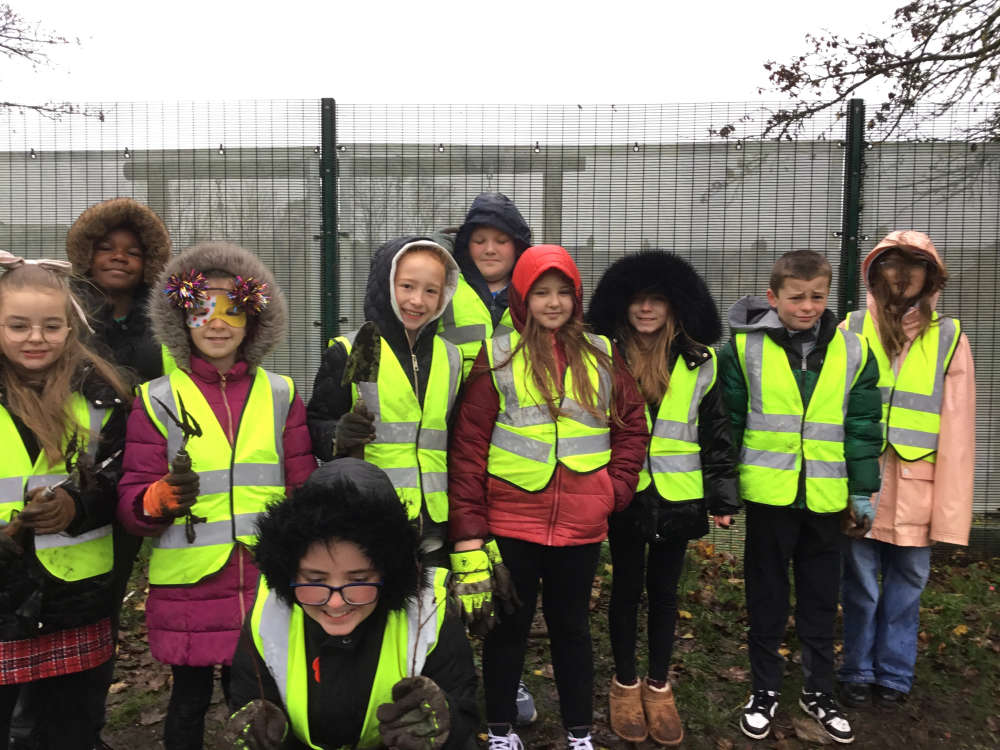
Braving driving rain, a crowd of determined young eco-champions gathered at Fairfield Road Primary School in Tameside for a mission with purpose to make a lasting difference to their local community and the natural world. On a day when most would have stayed indoors, Year 6 student Erin and her friends donned gloves and set off to plant trees and shrubs near the canal, their enthusiasm undimmed by the weather.
Young Voices for Nature
“We’re planting trees and shrubs to help the wildlife thrive near the canal,” Erin explained, standing amidst her classmates. “Being an eco school means we make our school better for the environment. Not all schools look after nature, and that can have a big impact on wildlife. By planting trees and habitats, we’re making sure our area is preserved for the future. If we don’t, things could get really bad with pollution in the air and local waters.”
These student-led projects aren’t a one-off. Erin described a thriving school garden where pupils have grown potatoes for the winter, sweet tomatoes in the summer, and even enjoyed fruit from thornless blackberry bushes, pear trees, and apple trees.
A School-Wide Philosophy
Mrs Foulds, Y5 class teacher and ECO Lead at Fairfield Road, is proud of what her school has achieved over six years as an accredited ECO school. “Our philosophy is to get children to love the place where they live, so they look after it. When they have a say in making the area nicer, they’re less likely to vandalise it. Every student from nursery to Year 6 takes part in environmental projects, planting, harvesting, and even enjoying the food they’ve grown in our kitchens.”
The school’s approach includes:
- Weekly environmental activities like potato planting and harvesting
- A vibrant “forest school” where children build and play using materials from nature
- A strong emphasis on recycling and responsible waste management
- Regular litter picks, both around the school and along their adopted stretch of the Ashton Canal
Mrs Foulds reflected on the challenges: “We can clear up litter but by the next week it’s back again. It’s shocking how much rubbish people dump. This is why our message, especially from the children, is so important, dumping litter affects the future of everyone.”
Learning by Doing
During the tree planting event, students from Years 4, 5, and 6 took turns in the muddy canal bank, supported by experts from the Canal and River Trust. Ash, a pupil whose father is an ecologist, shared his excitement “It means a lot because me and my dad love helping the environment. We look after this stretch of canal, and it’s important to keep it free from rubbish. If waste gets into rivers and the canal, it can end up in the ocean, harming fish, which could end up on our plates.”
James agreed, highlighting the school’s sustainable food initiatives: “We grow potatoes, tomatoes, apples, pears, all sorts of healthy foods that we use in the school canteen.”
Supported by the Community
Nidal, from the Canal and River Trust, helped guide the students as they planted hardy native hedgerow species such as holly, hazel, and dogwood. “Engaging young people with their local natural world creates generational legacies. In five years, these new hedgerows will provide homes for birds and insects, building a stronger, more resilient environment.”
Support from the Woodland Trust and Medlock Valley Project has been crucial in supplying trees and expertise, making sure that wildlife will have a sanctuary for years to come, even in the face of urban development.
Looking Ahead
Fairfield Road’s pupils are clear, protecting the future starts today, one tree at a time. Their hard work proves that even the youngest members of the community can be powerful agents of change, leaving a legacy that will grow for generations.
Read more about Fairfield Road Primary School’s ECO efforts at https://www.fairfieldroad.tameside.sch.uk/eco-council/




